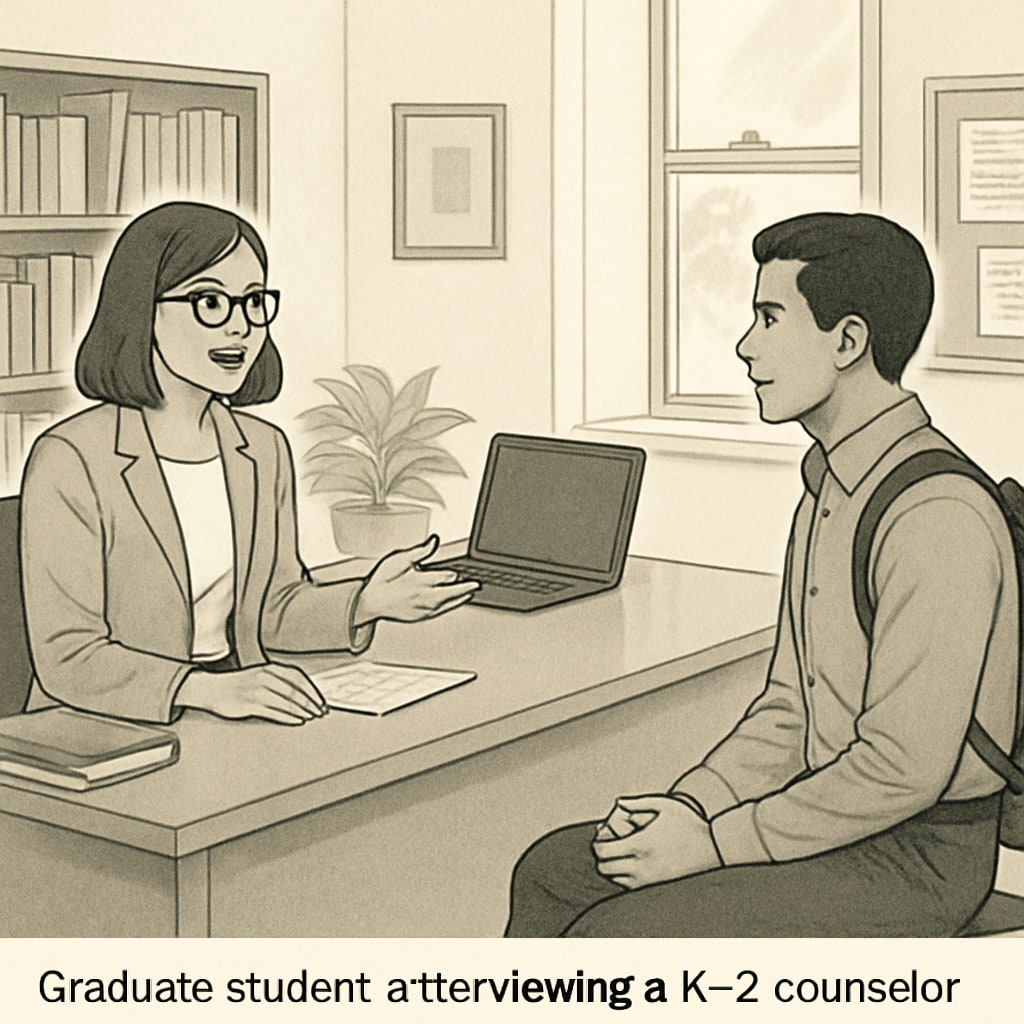For graduate students in education programs, completing research assignments often involves interviewing subject-matter experts. When your work requires insights from K-12 school counselors, knowing how to locate and engage these professionals can be challenging. This article offers practical advice on finding, communicating with, and successfully interviewing K-12 school counselors. It also provides tips to ensure your research assignment meets high academic and ethical standards.
Why Interview K-12 School Counselors for Research?
School counselors play a critical role in supporting students’ academic, emotional, and social well-being. Their unique perspective can provide valuable insights into the challenges and opportunities within the K-12 education system. For graduate students, interviewing these professionals can deepen understanding of school counseling practices, policy implementation, and student support systems.
However, securing an interview with a school counselor requires careful planning. Counselors are often busy managing their responsibilities, so reaching them involves persistence and professionalism.

How to Identify and Reach Out to K-12 School Counselors
Finding the right counselor to interview starts with targeted outreach. Here are some strategies to consider:
- School Websites: Many schools list staff directories on their websites. Look for counselors under the “Student Services” or “Support Staff” sections.
- Professional Associations: Organizations like the American School Counselor Association (ASCA) provide directories or networking opportunities to connect with counselors.
- Educational Networks: Reach out to teachers, administrators, or other education professionals you know who may have contacts in the counseling field.
- Social Media: Platforms like LinkedIn can help you find professionals with the title “School Counselor.” Be sure to approach them with a clear and respectful message.
Once you’ve identified potential interviewees, craft a concise and professional email or message. Clearly explain your research purpose, why you are reaching out to them, and what the interview entails. Always include your contact information and suggest flexible scheduling options.
Preparing for the Interview
Preparation is key to a successful interview. Follow these steps to ensure you’re ready:
- Research the School: Familiarize yourself with the counselor’s school environment, such as its demographics and location. This context can guide your questions.
- Develop a List of Questions: Prepare open-ended questions that encourage detailed responses. For example, “What are the biggest challenges you face in supporting students’ mental health?”
- Test Your Equipment: If conducting the interview virtually, ensure your audio and video equipment work properly. Have a backup recording method in case of technical issues.
- Review Ethical Guidelines: Graduate programs often require adherence to research ethics, such as obtaining consent and ensuring confidentiality. Be sure to follow these protocols.

Conducting the Interview
On the day of the interview, remember to be respectful of the counselor’s time. Arrive or log in a few minutes early, and begin by thanking them for their participation. During the interview:
- Maintain Professionalism: Dress appropriately, maintain good eye contact, and use active listening skills.
- Follow Your Questions: Refer to your prepared list but allow room for organic conversation. If a response sparks a new question, explore it.
- Take Notes: Record the interview (with permission) and jot down key points. This ensures you capture important details for later analysis.
- Close Gracefully: Conclude by thanking the counselor again and asking if they have any questions or additional comments. Follow up with a thank-you email after the interview.
Analyzing and Applying the Data
After completing the interview, review your notes and recording to extract key insights. Look for patterns, anecdotes, or quotes that support your research objectives. Be sure to properly cite the interview in your assignment, adhering to your institution’s formatting guidelines.
Finally, reflect on the experience. Did you gain a deeper understanding of K-12 counseling? Were there unexpected insights or challenges? These reflections can add depth to your analysis and future research endeavors.
By following these steps, graduate students can effectively engage with K-12 school counselors and produce meaningful research. The insights gained not only contribute to academic success but also to a greater appreciation of the vital work counselors do in shaping students’ futures.
Readability guidance: Use short paragraphs and concise sentences. Include lists where appropriate to improve clarity. Maintain a balance between professional tone and accessibility for readers.


